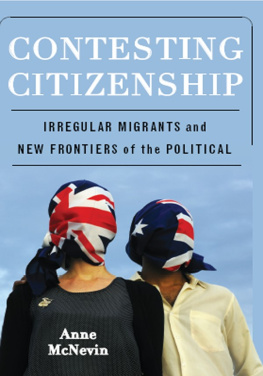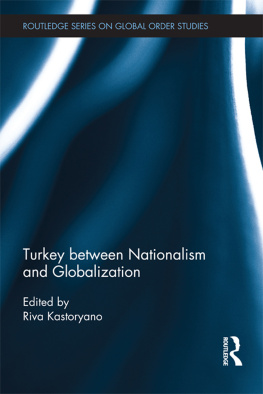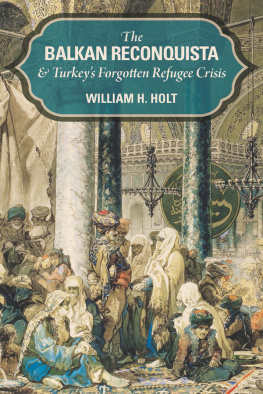PRECARIOUS HOPE
Migration and the Limits of Belonging in Turkey
AYE PARLA
STANFORD UNIVERSITY PRESS
STANFORD, CALIFORNIA
Stanford University Press
Stanford, California
2019 by the Board of Trustees of the Leland Stanford Junior University.
All rights reserved.
No part of this book may be reproduced or transmitted in any form or by any means, electronic or mechanical, including photocopying and recording, or in any information storage or retrieval system without the prior written permission of Stanford University Press.
Printed in the United States of America on acid-free, archival-quality paper
Library of Congress Cataloging-in-Publication Data
Names: Parla, Aye, author.
Title: Precarious hope : migration and the limits of belonging in Turkey / Aye Parla.
Description: Stanford, California : Stanford University Press, 2019. | Includes bibliographical references and index.
Identifiers: LCCN 2019009009 (print) | LCCN 2019009649 (ebook) | ISBN 9781503609440 (e-book) | ISBN 9781503608108 (cloth : alk. paper) | ISBN 9781503609433 (pbk. : alk. paper)
Subjects: LCSH: ImmigrantsTurkeySocial conditions. | TurksBulgariaSocial conditions. | CitizenshipTurkey. | National characteristics, Turkish. | Emigration and immigration lawTurkey. | TurkeyEmigration and immigration. | BulgariaEmigration and immigration.
Classification: LCC JV8745 (ebook) | LCC JV8745 .P37 2019 (print) | DDC 305.9/0691209561dc23
LC record available at https://lccn.loc.gov/2019009009
Cover design: Kevin Barrett Kane
Cover photograph: Behi Gnalan
Typeset by Motto Publishing Services in 10/14 Minion Pro
For my parents, Jale and Taha
CONTENTS
ACKNOWLEDGMENTS
This book had its origins at the Boazii University Library in Istanbul, where I met the inspiring women who, in addition to sharing their expertise as librarians, shared with me such amazing stories of their journey across the Bulgarian-Turkish border that they pulled me in like a magnet. In particular, I would like to acknowledge my gratitude to Nazmiye Ademolu and Mensiye Dahil; their stories do not appear in the book, but they are the original influence behind it. During the long journey that brought the book to this point, I was blessed to have as my guardian angels the legendary administrative team at Boazii LibraryZeynep Metin, Sema Taal, and Hatice n.
I was introduced to anthropology in an undergraduate class at Harvard, taught by Ken George, who gave me the first alluring glimpse of the ethnographic and theoretical richness of the field through his own work and his phenomenal teaching. He also introduced me to the anthropology of emotions and the groundbreaking work of Lila Abu-Lughod, who would become the kind of mentor one could only dream of. She supported me at every step along the way during graduate study at New York University. And she continues to inspire me by her dedication, her generosity, and her unique ethnographic style, which combines the most sophisticated theory with a novelists sensitivity to the details of individual lifeworlds. At New York University, I am also most indebted to Theresa Caldeira, Michael Gilsenan, Fred Myers, Susan Rogers and Bambi Schieffelin for all they have taught me. I consider myself especially lucky to have had Jessica Catellino in my cohort: after that first exchange in front of Rufus D. Smith Hall, I knew we would be great friends, but I did not yet realize just how much I would come to admire her intellectual grace over the years and how invaluable her support would prove to be.
The field research and writing for this book were made possible through the support of grants no. 106K162 and no. 108K522 from the Scientific and Technological Council of Turkey (TBTAK), an Exceptional Young Scholar Grant from the Turkish Academy of Sciences (TUBA), and a membership at the Institute for Advanced Study (IAS) in Princeton, New Jersey.
The activists and colleagues I met at the Migrant Solidarity Network taught me much about engagement and endurance. I benefited from the discussions, which frequently extended beyond the meetings and the protests and into lateand often musicalevening hours. I would especially like to thank Ufuk Ahska, Aye Akaln, Begm zden Frat, Ezgi Gner, Deniz zgr, Ceren ztrk, Muhsin Kemal imek, and Kerimcan Yldrm for thinking with me, challenging me, and broadening my perspective. Frat Gen and Zeyno Peknl deserve special thanks: they not only provided me with a most comfortable couch to crash on but even set aside a drawer where I stored some of the earliest scribbles of the manuscript.
Feedback from audiences and participants at various workshops have helped me immensely to think through my ideas and sharpen my analyses: the Rapoport Center for Human Rights and Justice at the University of Texas, Austin; the UCLA Center for the Study of International Migration; the Anthropology Department at UCLA; the Political Science Forum at Vassar College; the Hagop Kevorkian Center for Near Eastern Studies at New York University; the European Studies Center at the University of Florida; the Center for the Study of Social Difference at Columbia University; and the Department of Anthropology at Boston University. I would particularly like to thank Can Aksz, Gldem Baykal Byksara, Baak Can, Jessica Catellino, Joanna Davidson, Andy Davison, Eva-Marie Dubuisson, Karen Engle, Ilana Feldman, Ken George, Saygun Grarksel, Akhil Gupta, Sondra Hale, Zeynep Korkman, Bailey Miller, Kirin Narayan, Esther Romeyn, Susan Rottman, Maria Stoilkova, Anoush Suni, Miriam Ticktin, Roger Waldinger, Rob Weller, Lale Yaln-Heckman, and Berna Yazc. Saygun Grarksel and Kirin Narayan get to take credit for the main title of the book, Precarious HopeI think they announced it in unison during our delightful ethnographic writing workshop in Istanbul in 2016.
Most of the manuscript was completed at the Institute for Advanced Study, Princeton, where I was a Member in 201617 and a Visitor in 201718. The Institute was an exceptional space that combined the best of solitude with the best of intellectual engagement. I want to thank especially Lori Allen, Fadi Bardawil, Ruha Benjamin, Cline Bessire, Amy Buroway, Peter Coviello, Anne-Claire Defossez, Andrew Dilts, Thomas Dodman, Karen Engle, Sara Farris, Bernard Harcourt, David Kazanjian, Paul di Maggio, Pascal Marichalar, Reuben Jonathan Miller, Silvia Pasquetti, Peter Redfield, Shatema Threadcraft, Emily Zatkin, and Andrew Zimmermann, who have provided invaluable insights over formal discussions but also over lunch, three p.m. tea, late-night rehearsals of the New Orientalists band, and during walks in the Institute Woods, where an ephemeral sighting of a red fox may turn into a lasting thought. It is hard to put into words the gratitude and admiration I feel for Didier Fassin and Joan Scott, brilliant scholars and exceptional mentors, who lead by example and make the School of Social Science at IAS the piece of paradise on earth that it is. I cannot thank Linda Cooper, Jennifer Hansen, Laura McCune, Donne Petito, and Marcia Tucker enough for their expertise and tireless assistance. At Princeton, I reunited with dear old friends and priceless colleagues whose support was indispensable: Emine Fetvaci, Keena Lipsitz, and Grigore Pop-Elechesthank you. I know I will never quite be able to return the favor.
I feel fortunate to have a transnational group of colleagues from whose wisdom this work has benefited across the years: ala Ayka, Evren Balta, Banu Bargu, Jacqueline Bhabha, Kristen Biehl, Didem Dan, Mine Eder, Sumru Erkut, Bruce Grant, Alexander Kiossev, Esra zyrek, Umut Trem, Zachary Whyte, and Noah Zatz have offered insights that have stayed with me. I owe Bailey Miller and Ararat ekeryan huge thanks for helping me with the bibliography and to Emily (Max) Coolidge Toker for stepping in on such short notice. Lori Allen, Ate Altnordu, Yelena Baraz, Elizabeth Ann Davis, Elizabeth Harman, Ahmet Faik Kurtulmu, Pascal Marichalar, Esra zyrek, Peter Redfield, and Merav Shohet read parts of the manuscript in its latest stages and offered invaluable feedback, although I am afraid I have not been able to do justice to their insights. The manuscript was completed at Boston University, and I am grateful for the warm welcome and collegiality of my fellow faculty in the Department of Anthropology.
Next page





